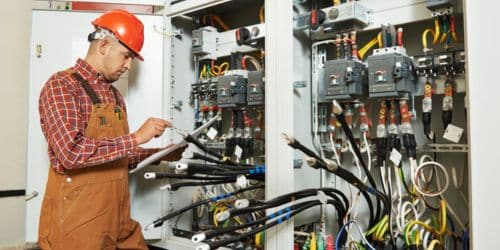Customers/clients depend on the electrical contractor to keep the lights and power functional in their residences. You spend your days as an electrician installing, maintaining, and repairing the various electrical devices that keep the world running smoothly. Whether you’re creating an electrical system for a new building or fixing a problem in an old one, something could go wrong on the job. For instance, poor wiring might cause property damage or harm one of your employees while they go about their work. For reasons such as this, electrician insurance is necessary.
Overview
Electrician insurance also known as electrical contractor insurance or electrician liability insurance, is a general liability insurance, that aids in defending against allegations that your electrical contracting business injured someone physically or materially damaged their possessions. These policies shield your company from financial harm caused by third-party property damage claims, workplace accidents, damaged commercial property, or lost business income.
The most typical policy for an electrician is public or general liability insurance. It protects your business in case a customer is hurt or their property is damaged due to an accident. However, you can tailor your electrician insurance to meet the specific risks and needs of your electrician business such as; additional protection, and covering things like inland marine for tools and equipment.
Electrician Insurance Coverage
Electrical insurance is necessary for both individual electricians and businesses that hire electricians. The insurance shields your firm financially from liability claims while safeguarding your organization’s assets, tools, and equipment. The value of claims, property damage, and legal fees are just a few of the issues that a small business insurance coverage for electricians may protect a company from. The choice of coverage depends on the particular requirements of the company.
Many electrical companies usually opt for the BOP (business owners’ policy). This policy combines three important coverage types and is usually less expensive than buying each type separately.
Here Are a Few Types of Electrician Insurance Coverage and What They Cover:
#1. Commercial General Liability
Every electrician requires a business general liability policy because of the hazards involved in their line of work. It is the foundation of your business insurance plan. General liability insurance protects you from claims that your work hurt, damaged, or hurt other people, but not your workers.
Your liability insurance, for instance, could cover medical expenses, court judgments, settlements, and legal defense for instance in a scenario where improper wiring causes a fire that results in both property damage and injuries.
#2. Commercial property insurance
Your insurance will cover damage to your company’s property or equipment from fire, theft, or other eligible events. Commercial property insurance covers the ownership or rental of computers, office furniture, tools, inventory, supplies, financial paperwork, and valuables.
#3. Business interruption insurance
Your insurance policy will reimburse lost income if you temporarily close your business due to a covered situation. Business interruption insurance, for instance, pays for issues like theft, wind damage, money lost as a result of broken goods, lost revenue, and additional costs like temporarily transferring to a new location. It is sometimes referred to as “business income insurance.”
Electrician Insurance Cost
When figuring out your company’s premium, the insurance company looks at a lot of details about your business. A small residential electrical contractor may make less than a large electrical contractor with a staff and fleet of trucks.
The cost of electrician insurance hence depends on a variety of things. Depending on the types of coverage and insurance amounts required, the value can range from as little as $50 per month or $600 per year to as much as several thousand dollars per month. Depending on the particular requirements of the particular firm, this value will change.
Some specific factors which insurance providers consider are;
- The city and state where the activity and business are located.
- Total yearly revenue generated.
- Your area of work: Risk is rated differently by providers for residential and commercial electricians. Also considered here is the number of remodeling and new installation work as well as the volume of high voltage to low voltage jobs done by the company.
- The size of your company: The likelihood of a loss rises with the number of employees as well as the number of vehicles in the company’s fleet.
- Your background: The longer you’ve worked in this field, the lower the potential risks should be.
- Your history of Insurance claims: Your rates will probably be higher if a claim has been made during the last three to five years.
- Your credentials: Maintaining your license and certification is essential, not just for financial reasons but also for insurance.
- The value of your property: The cost of the policies will depend on the worth of your tools and equipment, the cost of your buildings, and whether you own or rent them.
Additional Types of Electrician Insurance You Need
You can add more coverage choices to your electrician insurance package to make it complete. A few of them include:
#1. Workers’ Compensation
Almost all states, with a few exceptions such as Texas, mandate workers’ compensation insurance even with only one employee. Any risk associated with on-the-job injury or death is mitigated as a result of workers’ compensation insurance.
In the event of an injury, workers’ compensation insurance will cover:
- Medical expenses related to on-the-job injuries.
- lost wages if employees are absent from work.
- Benefits for whole or partial disability that are either temporary or permanent.
- When someone dies on the job, the person’s living dependents get death benefits.
#2. Commercial Auto Insurance
The electrical company has commercial auto insurance for all of its vehicles. Commercial auto insurance covers automobiles, vans, and trucks used for business, while personal auto insurance does not. Additionally, insurance provides security in the event of a car accident involving a company vehicle or an employee.
The following are some instances of business use of vehicles:
- Vehicle usage for only electrical business.
- You perform business operations in your car.
- You transport tools and electrical equipment in your car.
- The car is a property of your business.
- Workers drive your vehicle.
- You use your car for business reasons to transport people or commodities.
Also, the following are typical types of commercial auto insurance coverage:
- Physical harm responsibility: This includes physical harm to people that you or your staff unintentionally cause.
- Liability for property damage: This covers any accidental property damage you or your staff members create to third parties. Suppose you unintentionally hit your client’s automobile when it was parked in their driveway, this coverage under commercial auto insurance pays for the damage.
- Insurance coverage for personal injuries and medical expenses: Regardless of who caused the automobile accident, this will cover your medical costs and those of your passengers.
- Collision protection: If you and your coworkers get into a car accident, this will pay for the cost of fixing or replacing your cars.
- Comprehensive protection: This takes care of the price of fixing or replacing your car in the event of issues like fire, flood, vandalism, falling items, and theft.
- Insurance against uninsured motorist (UM): If you are hit by a driver who does not have auto insurance or does not have enough insurance, this will cover your medical bills and the costs of your passengers. UM coverage helps to cover damage to your vehicle caused by an uninsured motorist.
#3. BOP (Business Owner’s Policy)
A BOP is an excellent approach to cutting costs. In addition to typically including coverage for lost business income, it combines general liability and commercial property insurance. Typically, it is less expensive to buy all of these policies together than to buy them separately. The fact that you only need a single policy from a single insurer to cover all three risks simplifies recordkeeping.
A BOP can provide funding for:
- lawsuits resulting from a client’s harm.
- lawsuits involving unintentional harm to customers’ property.
- Defamation, copyright infringement, and other advertising-related lawsuits.
- Equipment, tools, and other firm property that is damaged or taken from the corporate location of your organization.
#4. Inland Marine
Electricians use a variety of tools that aid them do their jobs. With inland marine, an electrician can name individual tools or obtain a blanket coverage amount for tools and equipment, unlike other commercial property policies that only cover things at specified locations. Since this coverage accompanies the tools wherever they go, an electrician can make a claim to fix it if it breaks on a job site.
This policy usually offers coverage for:
- Any equipment less than five years old.
- Mobile equipment that is easily transported.
- Small delicate tools.
#5. Surety Bonds
In a surety bond, one party (the obligee) is guaranteed that the other party (the principal) would make good on their promise to the first party in the event that the surety or guarantor is unable to do so. The surety may then demand payment from the bond’s principal. While surety bonds are frequently required for government bids, they also give prospective customers, subcontractors, and other parties the assurance that any financial obligations they are owed will be fulfilled.
A performance bond is a typical illustration in the construction industry, where the surety may pay a customer compensation if the contractor is unable to finish a project satisfactorily. If the project is lacking, the contractor must reimburse the surety for customer losses.
Even though surety bonds are not insurance in the traditional sense, they work like insurance in that they can pay damages to people who get hurt.
Master Electrician Insurance Australia (Mea)
This company, originally known as the Electrical Contractors Association, was founded in 1937 and has been responsible for assisting and representing electrical contractors spanning more than 80 years, making it one of the oldest business associations of its kind. Due to the growing need for a national strategy for industry leadership and development, Master Electricians Australia was founded in 2008. Since then, the Master Electricians brand has established itself as a trusted symbol for both consumers and electrical contractors across the country.
Starting an electrical contracting business, hiring an apprentice, expanding your company, and making adjustments to change are all areas where MEA offers its members comprehensive support. Access to reliable counsel, business tools, financial savings, and advocacy support are also part of the MEA package.
Additionally, the benchmark in safety systems, free access to Standards, discounts on bookkeeping and marketing services, assistance with business structuring, fuel, automobiles, hiring, and more are all possible benefits for MEA members as a result of the extensive network of partnerships the association possesses. MEA could easily function as a business partner to electricians and electrical companies in the sector.
They also launched, the first Master Program for the industry in 2020, which offered step-by-step assistance for starting and expanding an electrical contracting business.
Master Electrician Insurance through their partnerships, offer; Electrical Contracting Insurance, Life Insurance, and Health Insurance as benefits for their members.
Journeyman Electrician Insurance
Journeyman electricians are those electricians who have completed a portion of the required training to become master electricians. They have the training and knowledge to work on their own, but they don’t have a license to be master electricians. Journeyman electricians install wires, fixtures, and control systems in commercial, industrial, and residential structures, but master electricians design the first electrical system.
As a journeyman electrician, you may connect transformers, circuit breakers, switches, and outlets or install lighting and security systems. Additionally, you can examine and test the electrical systems that are already in place, as well as manage apprentices’ work.
Similar to master electricians, electrical contractors, and companies, journeyman electricians also face various degrees of risks in the course of their electrical jobs. As they undertake jobs in the; residential, commercial, and industrial sectors, it is necessary for them to be prepared for work-related hazards and have necessary policies in place to mitigate such hazards. Listed below are some of the most important insurance products requirements for standard journeyman electrician insurance:
#1. Electrician Liability Insurance (General Liability Insurance)
The coverage provided by general liability insurance is for bodily injury, property damage, and advertising injuries sustained by third parties while on an insured’s property or as a result of the insured’s regular business operations.
#2. Errors & Omissions Insurance
This insurance takes care of problems that arise because of the policyholder’s mistakes. Professional liability insurance or E&O insurance protects Journeyman electrical contractors if a client alleges negligence and harm.
#3. Commercial Auto Insurance
Commercial vehicle insurance policies provide coverage for a variety of potential expenses for accidents involving the usage of vehicles classified as business vehicles.
#4. Tools & Equipment Coverage
From inexpensive sophisticated gear to basic hand tools, tools, and equipment insurance can cover a variety of products. Theft, damage, or vandalism that occurs while using, transporting, or storing equipment is a covered incident.
What are the ways to save on electricians’ insurance?
A few ways to save on electrician insurance include; comparing quotes from different policy providers, buying BOPs, becoming a member of a trade industry or association, and also implementing a workers’ safety program.
How do I become a licensed electrician?
To become a licensed electrician you must first; Complete preliminary education requirements like a high school diploma/GED, then apply for a certificate program/associate’s degree/apprenticeship program. Before you can apply for a license, you will have to complete the prerequisite training and schooling that your state requires.
What insurance do contractors need in NYC?
The insurance policies that contractors in NYC need include; General liability insurance, Business owner’s policy, Workers’ compensation insurance, Commercial auto insurance, and Contractor’s tools and equipment insurance.
See Also ELECTRICIAN SCHOOL: Best Electrician Schools in 2023 & How Much It Cos
Bottom Line
In the event that electricians are accused of wrongdoing or if their tools or other property is damaged, they must make sure they have the necessary liability insurance coverage in place beforehand. Also, Comprehensive and effective electrician insurance is often a requirement for some jobs in most parts of the US. This is to protect the electrician from financial disaster.
Electrician Insurance FAQs
Who needs electrician Insurance?
Individual electricians, or companies employing electricians, need electrician insurance.
What does electrician insurance cover?
In its most basic form, electrician insurance covers mostly any general form of liability and commercial liabilities as well.
Does an electrician need commercial auto insurance?
Any electrician who uses a vehicle for business purposes will definitely need commercial auto insurance.
What is the salary for a journeyman electrician?
The base salary for a Journeyman electrician, ranges from $58,900 to $75,700.
- INDUSTRIAL ELECTRICIAN: What Is It? Job Description, And How To Become One
- LICENSED ELECTRICIAN: Jobs, Requirements, Salary And How To Become One
- Fortune 100 Best Companies to Work For
- Woolworths Logo: History, Evolution & All You Need
- Best Business Books of All Time 2023 (Updated)
- ELECTRICIAN: What Electricians Do, How Much They Make & How to Become One
- RESIDENTIAL ELECTRICIAN: Definition, Jobs, Salary, and How to Become One






